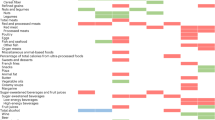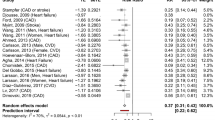Abstract
Background/Objectives:
The Dutch guidelines for a healthy diet aim to reduce major chronic diseases. However, supporting evidence on their overall association with all-cause and cause-specific mortality is limited. Recently, the Dutch Healthy Diet-index (DHD-index) has been developed to assess adherence to these guidelines. The aim was to examine the association between the DHD-index and all-cause mortality and deaths from cardiovascular disease (CVD), coronary heart disease (CHD), stroke and cancer.
Subjects/Methods:
We followed 3593 men and women aged 55 years and older enrolled in the Rotterdam Study, a population-based prospective cohort study, from baseline in 1990–1993 to 2011. A validated 170-item food frequency questionnaire at baseline was used to calculate the DHD-index score (maximum 90 points). Cox proportional hazard models were used to estimate hazard ratios (HRs) adjusting for age, sex, total energy intake, smoking and educational level.
Results:
During the 20-year follow-up, 1831 (51%) deaths were reported. Mean DHD-index score was 60.6 (s.d. 10.6). The score was inversely associated with all-cause mortality (highest vs lowest quartile HR 0.77; 95% confidence interval (CI) 0.67, 0.89). Inverse but non-significant associations were observed for mortality due to CVD (HR 0.74; 95% CI 0.55, 1.01), CHD (HR 0.60; 95% CI 0.34, 1.06) and stroke (HR 0.67; 95% CI 0.36, 1.22), whereas no association was observed with cancer mortality (HR 0.99; 95% CI 0.90, 1.11).
Conclusions:
A higher level of adherence to the Dutch dietary guidelines, as assessed with the DHD-index, was associated with a lower risk of all-cause mortality, probably due to an inverse association with cardiovascular causes of death.
This is a preview of subscription content, access via your institution
Access options
Subscribe to this journal
Receive 12 print issues and online access
$259.00 per year
only $21.58 per issue
Buy this article
- Purchase on Springer Link
- Instant access to full article PDF
Prices may be subject to local taxes which are calculated during checkout

Similar content being viewed by others
References
Hu FB . Dietary pattern analysis: a new direction in nutritional epidemiology. Curr Opin Lipidol 2002; 13: 3–9.
Ocké MC . Evaluation of methodologies for assessing the overall diet: dietary quality scores and dietary pattern analysis. Proc Nutr Soc 2013; 72: 191–199.
Waijers PM, Feskens EJ, Ocké MC . A critical review of predefined diet quality scores. Br J Nutr 2007; 97: 219–231.
Wirt A, Collins CE . Diet quality—What is it and does it matter? Public Health Nutr 2009; 12: 2473–2492.
Kant AK, Schatzkin A, Harris TB, Ziegler RG, Block G . Dietary diversity and subsequent mortality in the First National Health and Nutrition Examination Survey Epidemiologic Follow-up Study. Am J Clin Nutr 1993; 57: 434–440.
Wirfält E, Drake I, Wallström P . What do review papers conclude about food and dietary patterns? Food Nutr Res 2013; 57: 20523.
Jankovic N, Geelen A, Streppel MT, de Groot LCPGM, Orfanos P, van den Hooven EH et al. Adherence to a healthy diet according to the World Health Organization guidelines and all-cause mortality in elderly adults from Europe and the United States. Am J Epidemiol 2014; 180: 978–988.
Harmon BE, Boushey CJ, Shvetsov YB, Ettienne R, Reedy J, Wilkens LR et al. Associations of key diet-quality indexes with mortality in the Multiethnic Cohort: the Dietary Patterns Methods Project. Am J Clin Nutr 2015; 101: 587–597.
Kant AK, Schatzkin A, Graubard BI, Schairer C . A prospective study of diet quality and mortality in women. J Am Med Assoc 2000; 283: 2109–2115.
George SM, Ballard-Barbash R, Manson JE, Reedy J, Shikany JM, Subar AF et al. Comparing indices of diet quality with chronic disease mortality risk in postmenopausal women in the Women's Health Initiative Observational Study: evidence to inform national dietary guidance. Am J Epidemiol 2014; 180: 616–625.
Schwingshackl L, Hoffmann G . Diet quality as assessed by the Healthy Eating Index, the Alternate Healthy Eating Index, the Dietary Approaches to Stop Hypertension score, and health outcomes: a systematic review and meta-analysis of cohort studies. J Acad Nutr Diet 2015; 115: 780–800 e785.
Sofi F, Abbate R, Gensini GF, Casini A . Accruing evidence on benefits of adherence to the Mediterranean diet on health: an updated systematic review and meta-analysis. Am J Clin Nutr 2010; 92: 1189–1196.
Fung TT, Rexrode KM, Mantzoros CS, Manson JE, Willett WC, Hu FB . Mediterranean diet and incidence of and mortality from coronary heart disease and stroke in women. Circulation 2009; 119: 1093–1100.
Struijk EA, May AM, Beulens JW, Fransen HP, de Wit GA, Boer JM et al. Adherence to the Dutch Guidelines for a Healthy Diet and cancer risk in the European Prospective Investigation into Cancer and Nutrition-Netherlands (EPIC-NL) cohort. Public Health Nutr 2013; 17: 2546–2553. FirstView: 1-8.
Vergnaud AC, Romaguera D, Peeters PH, Van Gils CH, Chan DSM, Romieu I et al. Adherence to the World Cancer Research Fund/American Institute for Cancer Research guidelines and risk of death in Europe: Results from the European Prospective Investigation into Nutrition and Cancer cohort study. Am J Clin Nutr 2013; 97: 1107–1120.
McCullough ML, Feskanich D, Rimm EB, Giovannucci EL, Ascherio A, Variyam JN et al. Adherence to the Dietary Guidelines for Americans and risk of major chronic disease in men. Am J Clin Nutr 2000; 72: 1223–1231.
McCullough ML, Feskanich D, Stampfer MJ, Giovannucci EL, Rimm EB, Hu FB et al. Diet quality and major chronic disease risk in men and women: Moving toward improved dietary guidance. Am J Clin Nutr 2002; 76: 1261–1271.
McCullough ML, Feskanich D, Stampfer MJ, Rosner BA, Hu FB, Hunter DJ et al. Adherence to the Dietary Guidelines for Americans and risk of major chronic disease in women. Am J Clin Nutr 2000; 72: 1214–1222.
van Lee L, Feskens EJ, Hooft van Huysduynen EJ, de Vries JH, van 't Veer P, Geelen A . The Dutch Healthy Diet index as assessed by 24h recalls and FFQ: associations with biomarkers from a cross-sectional study. J Nutr Sci 2013; 2: e40.
van Lee L, Geelen A, van Huysduynen EJ, de Vries JH, van't Veer P, Feskens EJ . The Dutch Healthy Diet index (DHD-index): an instrument to measure adherence to the Dutch Guidelines for a Healthy Diet. Nutr J 2012; 11: 49.
Health Council of the Netherlands Guidelines for a Healthy Diet 2006. Health Council of the Netherlands: The Hague, 2006.
Struijk EA, May AM, Wezenbeek NLW, Fransen HP, Soedamah-Muthu SS, Geelen A et al. Adherence to dietary guidelines and cardiovascular disease risk in the EPIC-NL cohort. Int J Cardiol 2014; 176: 354–359.
Hofman A, Murad SD, van Duijn CM, Franco OH, Goedegebure A, Arfan Ikram M et al. The Rotterdam Study: 2014 objectives and design update. Eur J Epidemiol 2013; 28: 889–926.
World Health Organization International Statistical Classification of Diseases and Related Health Problems. WHO: Geneva, 1992.
Leening MJG, Kavousi M, Heeringa J, van Rooij FJA, Verkroost-van Heemst J, Deckers JW et al. Methods of data collection and definitions of cardiac outcomes in the Rotterdam Study. Eur J Epidemiol 2012; 27: 173–185.
Goldbohm RA, van 't Veer P, van den Brandt PA, van 't Hof MA, Brants HAM, Sturmans F et al. Reproducibility of a food frequency questionnaire and stability of dietary habits determined from five annually repeated measurements. Eur J Clin Nutr 1995; 49: 420–429.
Klipstein-Grobusch K, Den Breeijen JH, Goldbohm RA, Geleijnse JM, Hofman A, Grobbee DE et al. Dietary assessment in the elderly: Validation of a semiquantitative food frequency questionnaire. Eur J Clin Nutr 1998; 52: 588–596.
Anonymous NEVO Table Netherlands (Dutch Nutrient Database). Voorlichtingsbureau voor de voeding: The Hague, 1993.
Caspersen CJ, Bloemberg BPM, Saris WHM, Merritt RK, Kromhout D . The prevalence of selected physical activities and their relation with coronary heart disease risk factors in elderly men: the Zutphen Study, 1985. Am J Epidemiol 1991; 133: 1078–1092.
World Health Organization Global Recommendations on Physical Activity for Health. World Health Organisation: Geneva, Switzerland, 2010.
World Health Organization. International Society of Hypertension Guidelines for the Management of Hypertension. Guidelines Subcommittee. J Hypertens 1999; 17: 151–183.
Dutch Heart Association Hoog Cholesterol. Dutch Heart Association, 2014.
Zarrin R, Ibiebele TI, Marks GC . Development and validity assessment of a diet quality index for Australians. Asia Pac J Clin Nutr 2013; 22: 177–187.
World Cancer Research Fund/American Institute for Cancer Research Food, Nutrition, Physical Activity, and the Prevention of Cancer: A Global Perspective. AICR: Washington, DC, 2007.
Johansson L, Solvoll K, Bjørneboe GEA, Drevon CA . Under- and overreporting of energy intake related to weight status and lifestyle in a nationwide sample. Am J Clin Nutr 1998; 68: 266–274.
Hu FB, Stampfer MJ, Rimm E, Ascherio A, Rosner BA, Spiegelman D et al. Dietary fat and coronary heart disease: a comparison of approaches for adjusting for total energy intake and modeling repeated dietary measurements. Am J Epidemiol 1999; 149: 531–540.
Acknowledgements
The contributions of the authors were as follows: LL, AG, NJ, NV and EF designed the research; LL, AG and EF conducted the research; JK, JW, AH and OF provided the cohort database; LL performed statistical analyses; LL, AG and EF wrote the manuscript; EF had primary responsibility for final content. All authors read and approved the final manuscript. This study was funded by the Netherlands Organization for Health Research and Development (ZonMw; grant number 115100007). The Rotterdam Study is supported by the Erasmus MC University Medical Center and Erasmus University Rotterdam, The Netherlands Organization for Scientific Research (NWO), The Netherlands Organization for Health Research and Development (ZonMw), the Research Institute for Diseases in the Elderly (RIDE), The Netherlands Genomics Initiative (NGI), the Ministry of Education, Culture and Science, the Ministry of Health, Welfare and Sports, the European Commission (DG XII), and the Municipality of Rotterdam. OHF has received a grant from Nestlé Nutrition (Nestec Ltd.), Metagenics Inc. and AXA to establish a center on aging research. All funding sources had no role in design and conduct of this manuscript; collection, management, analysis and interpretation of the data; and preparation, review or approval of this manuscript.
Author information
Authors and Affiliations
Corresponding author
Ethics declarations
Competing interests
The authors declare no conflict of interest.
Additional information
Supplementary Information accompanies this paper on European Journal of Clinical Nutrition website
Supplementary information
Rights and permissions
About this article
Cite this article
van Lee, L., Geelen, A., Kiefte-de Jong, J. et al. Adherence to the Dutch dietary guidelines is inversely associated with 20-year mortality in a large prospective cohort study. Eur J Clin Nutr 70, 262–268 (2016). https://doi.org/10.1038/ejcn.2015.163
Received:
Revised:
Accepted:
Published:
Issue Date:
DOI: https://doi.org/10.1038/ejcn.2015.163
This article is cited by
-
Diet quality indices and dietary patterns are associated with plasma metabolites in colorectal cancer patients
European Journal of Nutrition (2021)
-
The effects of a lifestyle-focused text-messaging intervention on adherence to dietary guideline recommendations in patients with coronary heart disease: an analysis of the TEXT ME study
International Journal of Behavioral Nutrition and Physical Activity (2018)
-
The Rotterdam Study: 2018 update on objectives, design and main results
European Journal of Epidemiology (2017)
-
Adherence to the 2015 Dutch dietary guidelines and risk of non-communicable diseases and mortality in the Rotterdam Study
European Journal of Epidemiology (2017)
-
Associations between company at dinner and daily diet quality in Dutch men and women from the NQplus study
European Journal of Clinical Nutrition (2016)



